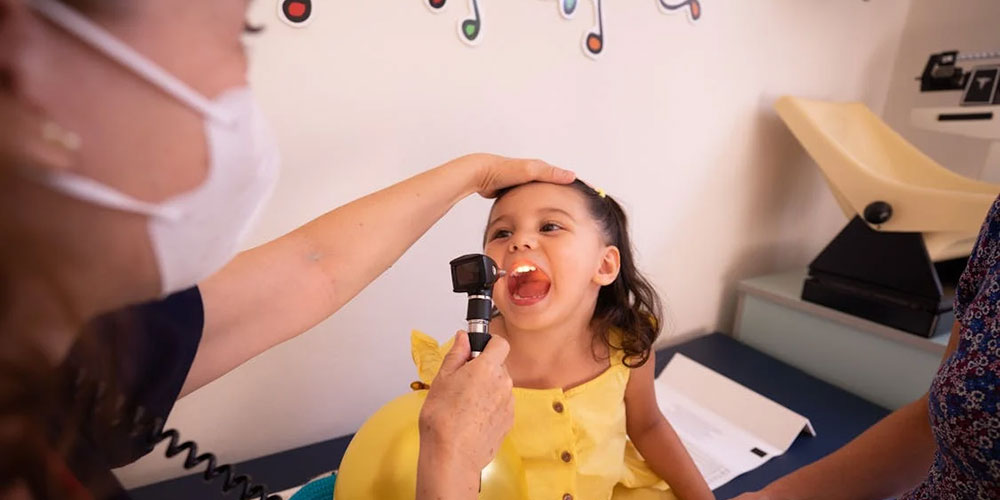Students with all types of interests find medical school is a good fit for them, including those who love being around children. Many physicians have built satisfying careers that combine practicing medicine and working with very young patients—they’re pediatricians.
Not everyone is meant for a pediatrician career, but it’s a great option for students who have the right qualities.
You might be a destined for a career in pediatrics if . . .
1. You have patience
Young patients often have short attention spans, and they can certainly squirm if any vaccinations are necessary. Dr. Amy Shriver, a pediatrician at Blank Children’s Hospital and medical director for Reach Out and Read Iowa, says that pediatricians need to be understanding when working with everyone in the room.
“We should work constantly and vigilantly on being nonjudgmental and patient with children and families,” she advises.
2. You’re a natural communicator
Keeping children healthy is really a team effort that involves collaborating with parents. They often need to verbally convey a lot of information to the adults in the room.
“I find that more than 50 percent of my job is providing guidance and advice for parents.”
“I find that more than 50 percent of my job is providing guidance and advice for parents,” Dr. Shriver explains.
Bear in mind that good communication involves more than just speaking. According to Dr. David Hill, a hospitalist pediatrician at Goldsboro Pediatrics, it’s also essential to listen and make careful observations.
3. You’re a lifelong learner
Being a good pediatrician requires a commitment to continually educating yourself. Medicine is constantly evolving, thanks to new research and health care technology. States also have strict requirements for continuing medical education.
Pediatricians are specifically tasked with staying up to date on anything relevant to children’s health. This can include child development and mental health issues. Pediatricians also need to understand how health concerns differ among age groups.
4. You’re a child wellness advocate
Because children can’t always speak up for themselves, they rely on adults to advocate for them. Pediatricians have the ability to make a huge difference in their patients’ lives by getting involved in outreach initiatives and helping to shape public policies.
“Pediatricians should know that they can provide improved services for children and families by connecting with organizations within their communities,” Dr. Shriver says.
5. You can empathize with others
Empathy is especially important for physicians caring for the littlest patients. One 2020 studyreveals physicians who show honesty and empathy, such as saying the baby’s name, in conversations with parents during life-threatening situations are rated more favorably. You need to meet families where they are.
“Emotional responsiveness is key,” Dr. Hill says. “If you feel like you don’t reliably read people well, this career may not best utilize your skill set.”

6. You have perspective
While some pediatrician careers have a specialized focus, general pediatricians work to help keep all kids healthy. Dr. Shriver says general pediatricians need to have perspective and be well aware of all the factors that can affect a child’s growth, development, and general well-being. That includes socioeconomic, educational, cultural, and racial considerations.
Dr. Hill also points out that pediatricians who are parents must understand their own family may be very different from the ones they encounter on the job.
“You must remember that other families face diverse challenges.”
“It’s easy to overemphasize your own experience and forget that other children can be very different from your own,” he says. “You must remember that other families face diverse challenges.”
7. You notice details
Young children often have difficulty expressing their emotions. This may be because they’re frustrated, upset, or lack the appropriate vocabulary. Being able to notice nonverbal cues is essential in such instances.
Pediatricians also need to be able to identify when they’re seeing something outside of the norm.
“If pediatrics were really just ear infections and colds all day, it would be easy,” Dr. Hill explains. “But the hard part is sorting out the serious pathology from the quotidian and not missing the rare stuff.”

8. You’re young at heart
A playful attitude and pediatrics go hand in hand. That’s partly why Dr. Hill chose the field. He didn’t initially intend to become a pediatrician, but he found it brought him the most joy.
“I’m getting paid to do something that is inherently, intensely fun.”
“I’m getting paid to do something that is inherently, intensely fun,” Dr. Hill says. “If you feel that way about the best parts of the job, then you can cope with the less enjoyable aspects.”
Be an MD with impact
Being a good pediatrician requires a unique combination of qualities as well as technical skills that can only be acquired with the right education and training. If you’re interested in pursuing a pediatrician career, it might be time to start comparing medical schools.
Learn more about how you can select an institution that meets your needs by checking out our article, “How to Choose a Medical School: 9 Things to Evaluate Before Accepting.”
Ready to start your medical school journey?
Are you considering St. George’s University Medical School? If you need any more convincing, just reach out to some graduates or current students. They’re happy to tell you what their experiences were like.
If you feel like SGU could be the right medical school for you, take the next step. Continue your research by visiting our request information page.
*This article was originally published in May 2019. It has since been updated to reflect information relevant to 2021.


